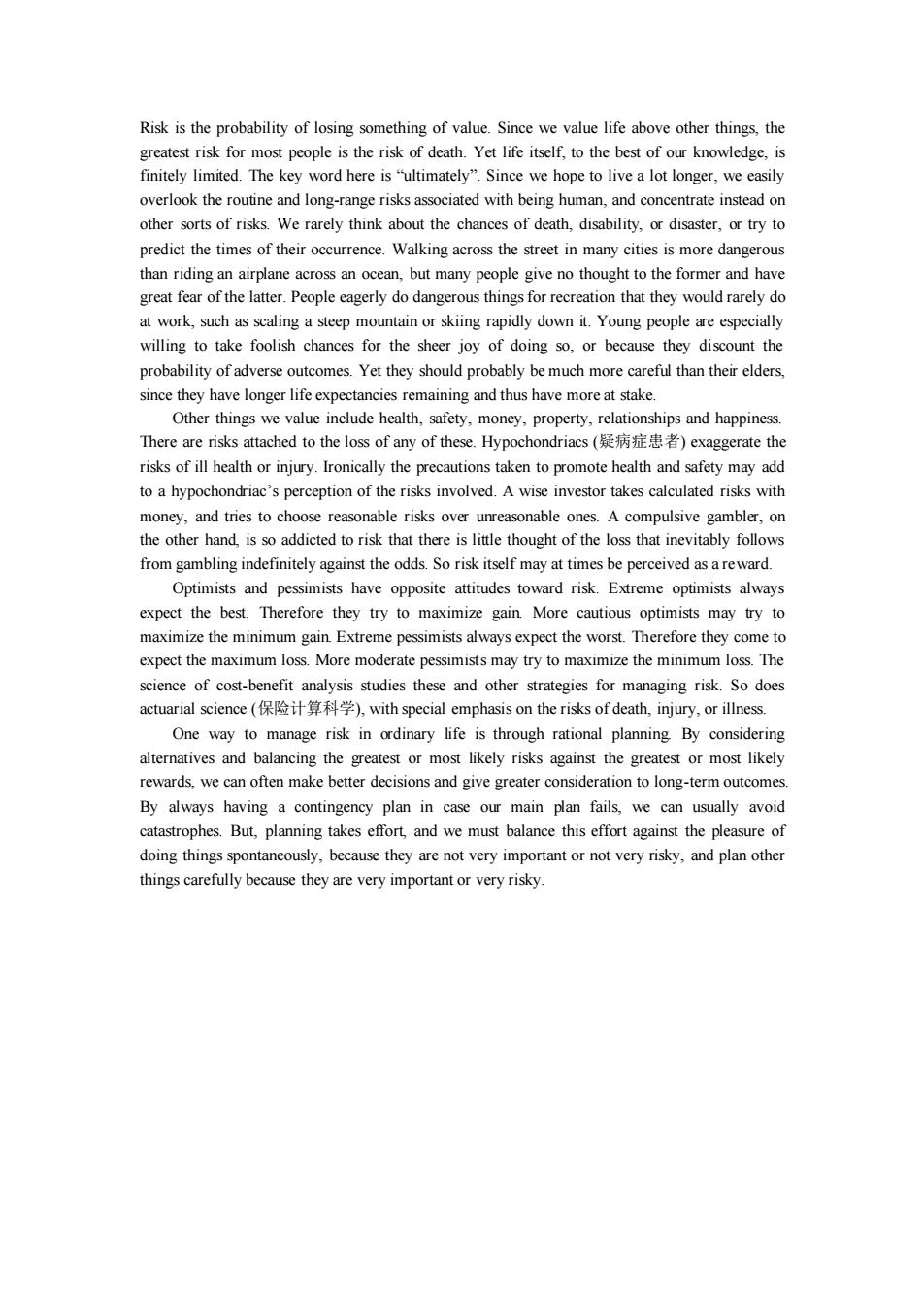
Risk is the probability of losing something of value.Since we value life above other things,the greatest risk for most people is the risk of death.Yet life itself,to the best of our knowledge,is finitely limited.The key word here is"ultimately".Since we hope to live a lot longer,we easily overlook the routine and long-range risks associated with being human,and concentrate instead on other sorts of risks.We rarely think about the chances of death,disability,or disaster,or try to predict the times of their occurrence.Walking across the street in many cities is more dangerous than riding an airplane across an ocean,but many people give no thought to the former and have great fear of the latter.People eagerly do dangerous things for recreation that they would rarely do at work,such as scaling a steep mountain or skiing rapidly down it.Young people are especially willing to take foolish chances for the sheer joy of doing so,or because they discount the probability of adverse outcomes.Yet they should probably be much more careful than their elders, since they have longer life expectancies remaining and thus have more at stake. Other things we value include health,safety,money,property,relationships and happiness. There are risks attached to the loss of any of these.Hypochondriacs(疑病症患者)exaggerate the risks of ill health or injury.Ironically the precautions taken to promote health and safety may add to a hypochondriac's perception of the risks involved.A wise investor takes calculated risks with money,and tries to choose reasonable risks over unreasonable ones.A compulsive gambler,on the other hand,is so addicted to risk that there is little thought of the loss that inevitably follows from gambling indefinitely against the odds.So risk itself may at times be perceived as areward. Optimists and pessimists have opposite attitudes toward risk.Extreme optimists always expect the best.Therefore they try to maximize gain.More cautious optimists may try to maximize the minimum gain Extreme pessimists always expect the worst.Therefore they come to expect the maximum loss.More moderate pessimists may try to maximize the minimum loss.The science of cost-benefit analysis studies these and other strategies for managing risk.So does actuarial science(保险计算科学),with special emphasis on the risks of death,injury,or illness.. One way to manage risk in ordinary life is through rational planning By considering alternatives and balancing the greatest or most likely risks against the greatest or most likely rewards,we can often make better decisions and give greater consideration to long-term outcomes. By always having a contingency plan in case our main plan fails,we can usually avoid catastrophes.But,planning takes effort,and we must balance this effort against the pleasure of doing things spontaneously,because they are not very important or not very risky,and plan other things carefully because they are very important or very risky
Risk is the probability of losing something of value. Since we value life above other things, the greatest risk for most people is the risk of death. Yet life itself, to the best of our knowledge, is finitely limited. The key word here is “ultimately”. Since we hope to live a lot longer, we easily overlook the routine and long-range risks associated with being human, and concentrate instead on other sorts of risks. We rarely think about the chances of death, disability, or disaster, or try to predict the times of their occurrence. Walking across the street in many cities is more dangerous than riding an airplane across an ocean, but many people give no thought to the former and have great fear of the latter. People eagerly do dangerous things for recreation that they would rarely do at work, such as scaling a steep mountain or skiing rapidly down it. Young people are especially willing to take foolish chances for the sheer joy of doing so, or because they discount the probability of adverse outcomes. Yet they should probably be much more careful than their elders, since they have longer life expectancies remaining and thus have more at stake. Other things we value include health, safety, money, property, relationships and happiness. There are risks attached to the loss of any of these. Hypochondriacs (疑病症患者) exaggerate the risks of ill health or injury. Ironically the precautions taken to promote health and safety may add to a hypochondriac’s perception of the risks involved. A wise investor takes calculated risks with money, and tries to choose reasonable risks over unreasonable ones. A compulsive gambler, on the other hand, is so addicted to risk that there is little thought of the loss that inevitably follows from gambling indefinitely against the odds. So risk itself may at times be perceived as a reward. Optimists and pessimists have opposite attitudes toward risk. Extreme optimists always expect the best. Therefore they try to maximize gain. More cautious optimists may try to maximize the minimum gain. Extreme pessimists always expect the worst. Therefore they come to expect the maximum loss. More moderate pessimists may try to maximize the minimum loss. The science of cost-benefit analysis studies these and other strategies for managing risk. So does actuarial science (保险计算科学), with special emphasis on the risks of death, injury, or illness. One way to manage risk in ordinary life is through rational planning. By considering alternatives and balancing the greatest or most likely risks against the greatest or most likely rewards, we can often make better decisions and give greater consideration to long-term outcomes. By always having a contingency plan in case our main plan fails, we can usually avoid catastrophes. But, planning takes effort, and we must balance this effort against the pleasure of doing things spontaneously, because they are not very important or not very risky, and plan other things carefully because they are very important or very risky